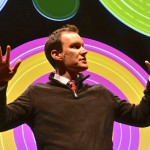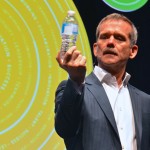“Change Starts Here” @ Conference 2014: Happiness and the Power of Negative Thinking
How much does happiness matter in business?
According to psychologist, consultant and author Shawn Achor, happiness counts in large amounts—and as CEO of GoodThink Inc., his research has found a warm reception in Forbes and with Fortune 500 companies alike.
As the first of the four plenary speakers at the recent 2014 HRMA “Change Starts Here” Conference+Tradeshow, Achor’s findings were similarly well-received by the 1,000+ audience of HR professionals and business leaders gathered at the Vancouver Convention Centre West on April 15-16, 2014.
Happiness is Serious Business
Achor’s research does not so much negate the thinking that success brings happiness as it does turn such thinking on its head—successful people are happy because they are happy. Drawing upon his own studies at Harvard University—including a survey of 1,600 high achieving undergraduates—together with supporting research from around the world, Achor is a strong and energetic proponent of positive psychology.
What the studies revealed were seven basic principles, captured by Achor in The Happiness Advantage, which reflect our personal and professional levels of success. Leveraging positive mindsets, learning to look for patterns of possibility instead of failure and investing in relationships that sustain such thinking are all on the list—topping it is the happiness advantage itself.
As to just how much punch happiness packs at work, Achor shared the following figures as published in the Harvard Business Review in 2012. Happy people on average generate 37 per cent greater sales, are 31 per cent more productive, three times more productive, display 23 per cent fewer fatigue syndromes, are 40 per cent more likely to be promoted and are up to 10 times more engaged—all of which bodes well for any business.
‘Onlyness’ Counts For Everyone
For fellow plenary speaker Nilofer Merchant, that happiness and productivity is tied directly to the successful identification of our ‘onlyness’ as both individuals and organizations. While underlying values and shared goals are essential, defining and honing the differentiators provides inestimable drive and far greater potential for innovation.
Having worked for major companies like Apple and a number of early internet startups, Merchant has since personally launched over 100 products worth $18 billion in sales and become a sought after advisor by companies seeking to develop new strategies worldwide. Awarded Thinkers50‘s “Future Thinker Award” in 2013, she was named the #1 person most likely to influence the future of management—and encouraged HR to think boldly about its role moving forward.
What Merchant acknowledged throughout was the impact of the individual in the new social era—wherein connected individuals can now do what once only centralized organizations can do. Where the opportunity exists for business leaders is to recognize this, admit to the newfound lack of central control, and combine the efforts of such social era super stars to create a greater constellation and culture of guided potential. In doing so, recruiting and HR become both dynamic contributors and “Curators of Greatness” as per the title of her presentation.
Drawing upon her own failures as much as her successes, Merchant stressed the importance of lifetime learning—and a willingness to unlearn.
HR’s Six Core Competencies
For those seeking HR essentials, the second day began with an unrivaled presence in the HR world. When Dave Ulrich talks HR, business listens—for good reason. Presented a lifetime achievement award in 2012 recognizing him as “the father of modern of human resources” by HR Magazine, Ulrich has published over 200 articles and two dozen books on the topic.
As a professor at the Ross School of Business and a partner at the RBL Group, what Ulrich and company have been tracking for the past 25 years are the core competencies for effective HR as they relate to organizational success. Six waves of global data collection from both HR and non-HR professionals have provided the core of a body of research.
What Ulrich drove home was the continued evolution of HR’s critical business input. As innovators and integrators, strategic positioners, capability builders, change champions, technology proponents and credible activists—the top six core competencies identified—HR’s potential contributions are considerable.
As per Ulrich’s findings, HR’s role as a credible activist is considered integral both by non-HR peers, as well as by HR professionals, as an assist in achieving personal effectiveness. However, the degree to which that attribute is perceived to help achieve business results is low. Where HR’s opportunity to grow business results showed through most clearly in the research was in the areas of technology, capability building, and as innovators and integrators.
Moreover, while he stressed the importance of HR knowing the business inside out, he encouraged a S.T.E.P.E.D. approach to considering the impact of the social, technical, economic, political, environmental and demographic trends and their inevitable impact on the best laid plains.
The Sky Is Not the Limit
With Ulrich providing a solid HR anchor, the final plenary speaker provided glimpse after fascinating glimpse of a bigger picture few ever see—planet Earth as viewed from the International Space Station (ISS).
In a lifetime of firsts, it was as commander of the ISS that Col. Chris Hadfield stepped boldly into the public imagination. Sharing his crew’s journey in stunning pictures, insights and song via social media, Hadfield’s passion for communication changed the way a great many look at the skies above.
As per the title of his plenary presentation, “The Sky is Not the Limit”, Hadfield’s insights went to the heart of HR’s most enduring challenges and realms of opportunity in the fields of leadership, teamwork and collaboration. Working in close confines with an international crew, Hadfield re-iterated the importance of effective communications and celebration in any team setting.
Moreover, in what seems apparent contrast to popular thought, Hadfield espoused the power of negative thinking. As within An Astronaut’s Guide to Life, he explained that such thinking—hinged upon working through every possible thing that can go wrong and addressing those fears head on—is what keeps astronauts alive and gives any team a winning edge by clearing the way for focused achievement of any goal imaginable.
HR Celebrates Success and Change
Celebration played a key role as always at the 52nd Annual HRMA Conference+Tradeshow with the recognition and revealing of the 2014 winners of the Rising Star Award and Awards of Excellence: Innovation and HR Professional of the Year.
In addition to presentation four honourary life memberships, the plenary stage also swelled with the West Coast Symphony to honour outgoing BC HRMA CEO Simon Evans, CHRP—and later introduce new CEO Anthony Ariganello.
Save the Date
The 53rd Annual HRMA Conference+Tradeshow is slated to return to the Vancouver Convention Centre West on April 28-29, 2015.
(PeopleTalk Summer 2014)














